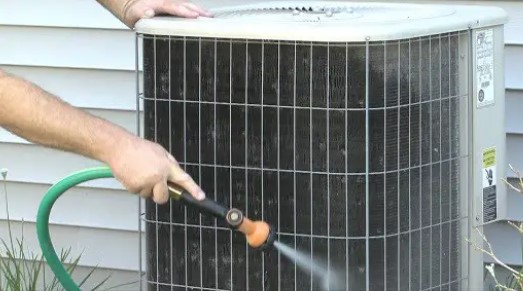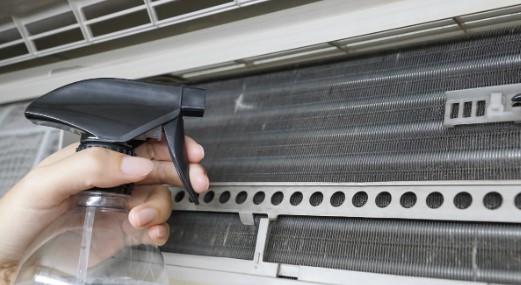Amid hot weather, cooling systems are a lifeline.
However, should you clean your AC with water for a performance booster?
Exploring the fine line between effective maintenance and potential damage, this guide explores the do’s and don’ts, ensuring your cooling unit stays efficient without getting soaked in trouble.
Should I Spray My AC Unit With Water? The Dos and Don’ts
Sometimes it might be beneficial for you to spray your AC unit with water.
However, there are certain do’s and don’ts you must follow to prevent your AC from being damaged.

Let’s explore the major dos and Don’ts you should follow to ensure the efficient working of your AC unit.
The Do’s
Clean your AC’s Exterior: Spritzing your AC unit’s exterior is key for debris removal. Choose a gentle water stream from a hose to clean the fins and coils from dust dirt, leaves, or residue accumulation.
Safety First: Prioritize safety by shutting off the air conditioner’s power. This prevents any electrical mishaps during the cleaning process.
Use Mild Pressure: Moderate water pressure prevents sensitive fins and coils. Harsh pressure could distort these components, hampering efficiency.
Use of Soapy Solution for Tough Stains: To tackle stubborn stains, a mild detergent-water mixture works wonders. Apply gently with a soft brush or cloth, then rinse completely.
Regular maintenance: Integrate water sprays into routine maintenance,
fortifying efficiency and elongating your AC’s lifespan.
The Don’ts
Avoid Spraying on Electrical Parts: While cleaning, avoid spraying water directly on the electrical parts like the control board or wiring to prevent damage and safety risks.
Maintain Moderate Pressure: Avoid high-pressure water to protect the fins and coils, ensuring ideal unit effectiveness.
Prioritize Safety: Always deactivate the air conditioner’s power to ensure a protected cleaning process, preventing disasters.
Avoid Excessive Water Inside: Prevent excessive water from saturating the air conditioner’s interior parts to avert mold growth and related issues.
Mind the Climate: Pick suitable weather conditions for cleaning, avoiding extreme elements like strong winds, heavy rain, or extreme heat for a more effective and safer process.
Professional Maintenance Matters: Supplement exterior cleaning with professional maintenance by trained technicians. They can direct comprehensive checks and address internal issues for your AC’s safety.
Spraying Water on Air Conditioner’s Condenser While Running

Spraying water on your air conditioner’s condenser coils during cleaning could appear to be routine, however, it could damage your unit.
Dirty coils prevent heat transfer, forcing your AC to overwork, prompting expanded energy costs and a shorter lifespan.
Choose a soft brush or fabric to tenderly clear trash, and if water is important, use distilled water to prevent coil damage.
For a safer and more thorough cleaning, consider hiring a professional, especially with central AC units.
How do I Cool Down My AC Condenser?
Troubleshooting Steps:
– Ensure the unit is plugged in and check the breaker to ensure it’s not tripped.
– Verify if the fan is running; if not, reset the breaker or replace the fan motor.
– Check if the compressor, reset the breaker if it’s not running and consider compressor replacement if necessary.
– If the compressor runs but the house isn’t cooling, check the refrigerant.
– If all checks fail to resolve the cooling issue, seek professional help for a thorough diagnosis and resolution.
Should You Clean Your AC?
Yes. Regularly cleaning your air conditioner is crucial for better efficiency and indoor air quality.
Refer to your manual for specific instructions. Start by powering off the unit and removing its cover.
Use a soft brush or cloth to clean dust from coils and components.
For stubborn dirt, a coil-cleaning soapy solution might be necessary. Rinse the coils thoroughly, ensuring they’re dry before reattaching the cover.
How Long Should You Leave Your AC to Dry Cleaning?
The timing varies based on factors like the cleaner type. For water-based cleaners, wait for 24 hours for the unit to completely dry, preventing potential damage.
Solvent-based cleaners commonly require only an hour or two before safely turning on your forced air conditioner.
How to Clean an AC Condenser?
To clean your AC condenser:
– Disconnect the power to the AC unit to ensure safety from electrical hazards.
– Use a brush or a vacuum with a brush attachment to delicately clear dirt and debris from the condenser fins, avoiding any damage.
– If the fins are heavily soiled, gently rinse them with a hose using a mild stream of water—avoid high-pressure washing to prevent fin damage.
– Straighten any bent fins using a fin comb for optimal functionality.
– Reconnect the power to the AC unit and switch it on to ensure proper functionality after cleaning.
Conclusion
Maintaining your AC requires cautious cleaning and regular checks.
By adhering to guidelines and seeking professional assistance when required, you will keep your unit efficient, extending its life expectancy for comfortable, cool days ahead